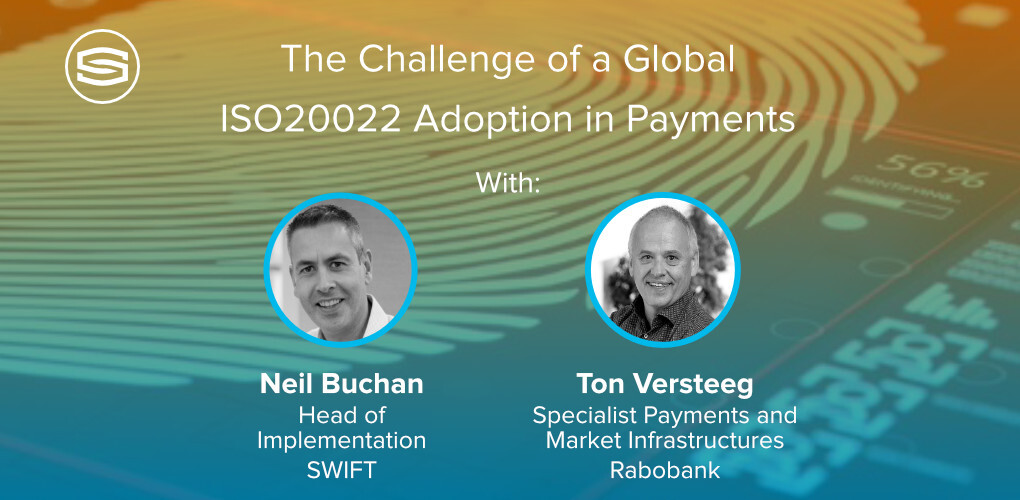
Insights & Opinions
The Challenge of a Global ISO20022 Adoption in Payments
Tue, 07 Mar 2023


ISO what? ISO 20022 is an open global standard for financial information. It provides consistent, rich and structured data that can be used for every kind of financial business transaction.
We invited Neil Buchan, Head of Standards Implementation at SWIFT, and Ton Versteeg, Specialist Payments and Market Infrastructures at Rabobank, to better understand why it takes decades for the global financial industry to adopt this global standard.
To give you an idea: when I started my career in 2007, I was already testing ISO20022 XML files for SEPA payments. We are now 15 years later and still discussing the ISO20022 developments.
Reasons for ISO20022 Migration
The advantages of migrating are evident on paper. Using a common data language translates into more consistency in the data. As different payment types could be processed by the same payment factory, it may lead to economies of scale for the industry.
Ton: "At Rabobank, we have three payment engines running at the moment: one for instant payments, one for SEPA and one for cross-border payments. And, of course, we can move to one in the future, but that will take time."
What's more: ISO20022 provides richer and more structured data. As Ton explained: "Having more structure helps our compliance departments, especially the sanction screening and the name screening and other KYC areas. There's the biggest advantage for us banks at the moment, in my opinion."
The same richer and more consistent data language opens new doors to innovation and customer experience. Having all sorts of payments on one messaging standard will allow banks to take the complex processing into their own hands, making the life of corporates much easier, as they can send one batch with all kinds of payments, for example.
From the audience, we also learned about the possible hidden opportunity of increased competitiveness in correspondent banking and the cross-border payments space since networks like Visa Direct, Wise, and Ripple are closed-loop systems that have already adopted ISO20022.
But even within the existing correspondent banking context, there are opportunities, explained Neil. He believes that a more standardised approach globally will lead to more competitive, better-priced packages from financial services software providers, that are also more consistent.
Barriers to ISO20022 Adoption
For long, the banking industry was okay working with legacy MT messages for cross-border payments. It is only after a couple of regional pushes to ISO20022, from, for example, the Eurosystem, Bank of England, but also from Asian market infrastructures, that the mindset in the industry shifted in favour of ISO20022.
Global banks that are direct participants in all those market infrastructures see it as an opportunity to work towards a global common language.
Neil explained that perhaps the biggest barrier is that ISO20022 is often seen as a technical requirement instead of a business opportunity: "When we embark on any project, we often play face-off against the traditional project managers. And obviously, here, many people see ISO as being more of a technical project, which I would argue isn't so much the case. Yes, there's a technical part to it. But of course, this can be operational as far as procedures; it can be the end customers as far as corporate or, to a degree, even us as individuals."
It is exemplary of the huge number of stakeholders involved. They all must be aligned for a successful implementation, both within their organisation and across organisations. Banks are involved, but also market infrastructures, SWIFT, corporates, ERP software providers… the list goes on.
Rabobank is preparing the adoption of IS020022 in the cross-border processes by moving people from the instant payments and the SEPA teams with experience in the cross-border payments team to exchange knowledge.
Not all banks work towards ISO20022 at the same speed, and down the process, on the level of corporates, you also have front runners and laggards. Even multinationals that work with banks across the globe are confronted with the different interpretations of ISO20022, which doesn't always make it easy to deal with. On top of that, not all their messaging is ready for ISO20022 (MT101, for example, is out of the scope of CBPR+, SWIFT's cross-border payments and reporting programme).
Banks like Rabobank and SWIFT are also there to help other banks through user groups, webinars and sharing information bilateral, explained Ton, the Chairman of the SWIFT User Group in The Netherlands. They consider ISO20022 and its migration a non-competitive space where collaboration will drive further adoption.
Neil: "We need to recognise that ISO 20022 is an open standard. That brings flexibility, and if there's a valid business justification from any ecosystem worldwide, even if that's basically one region that wants a certain field, and it's a valid business justification, then that gets accepted into ISO."
He continued: "So even on an optional basis, so within a community, they can then say something is super important, and that has to be provided. This is then decided and probably legislated in a country, which is where you get permutations. And that, of course, brings in a degree of confusion and inconsistency."
That explains why Neil believes it will take many more iterations of implementing ISO to further improve the consistency and data quality of these messages.
Despite these barriers, big market infrastructures across the globe are migrating and Neil expects that by 2025 probably +80% of them will be migrated to ISO20022.
Conclusion
The barriers are no longer what they used to be. The industry to evolving to ISO20022 and that will make it much easier for the industry to adopt new innovations and improve customer experience.
Change takes time and the more stakeholders are involved, the harder it gets. Welcome to the world of cross-border payments 😉.